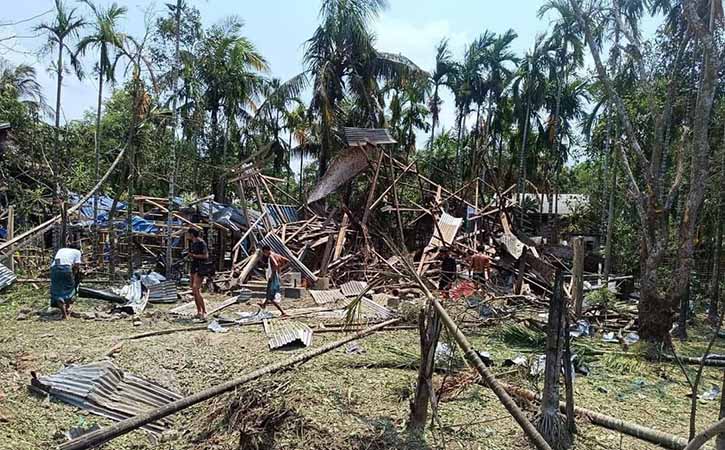Arakan Army targeting Rohingya, Myanmar's bitter future
Despite the Internet blockade imposed by the military junta, the United Nations has received “frightening and disturbing reports" of attacks against Rohingya civilians. Increasingly in difficulty on the ground, the junta is fuelling inter-ethnic tensions, enlisting (even forcibly) Rohingya to fight the local ethnic militia. The country is thus reverting to sectarian violence.
Yangon (AsiaNews) – The atrocities committed in recent months in Myanmar’s western Rakhine state seem to anticipate a new phase of violence that could affect the whole country once the civil war between ethnic militias and the army ends.
For days, representatives of the United Nations have been talking about “frightening and disturbing reports" of attacks against Rohingya civilians by the country’s military but also by the local ethnic militia, the Arakan Army (AA), which controls much of the territory of Rakhine.
“Once again, the world seems to be failing a desperate people in their hour of peril while a hate-driven unnatural disaster unfolds in real time in Myanmar’s Rakhine State,” said Tom Andrews, the UN Special Rapporteur on the human rights situation in Myanmar.
“[F]rom Northern Rakhine, alarming and credible reports of killings, enforced disappearances, and widespread arson are emerging,” Andrews added.
About 45,000 Rohingya civilians have been displaced after a series of fires broke out in and around the city of Buthidaung, destroying homes and crops, according to the UN.
The Rohingya blame the AA, which in turn blames the junta for airstrikes.
Satellite images show the devastation caused by fires in April and May, but with the Internet blocked by the military, it is impossible to have reliable information.
After the AA captured the city, fighting moved to the nearby town of Maungdaw; as a result, there are "clear and present risks of a serious expansion of violence", said Liz Throssell, spokeswoman for the Office of the UN High Commissioner for Human Rights.
As the International Crisis Group (ICG) points out in a report released earlier this month, tensions have been mounting for some time between the AA, dominated by Buddhist Rakhine, and Muslim Rohingya.
Unlike other parts of the country, violence in Rakhine broke out in November after the AA joined other ethnic militias in an offensive against the Myanmar army.
Until then, a ceasefire had been in place (except for a brief period in mid-2022) between the AA and Myanmar’s military, which seized power in a coup d'état in February 2021 that sparked the current conflict.
Since then, ethnic militias (who have been fighting for greater autonomy in their homelands since independence from the United Kingdom in 1948) have joined other armed groups fighting the military regime, which appears increasingly hard-pressed.
The AA has always fought for an ethnic Rakhine state. But some 600,000 Rohingya live within its territory, denied citizenship by the Myanmar government, since they are viewed as illegal immigrants from Bangladesh.
In 2017, they were the main target of a campaign of repression by the military, which is now facing proceedings for genocide at the UN International Court of Justice. At least 750,000 people fled to neighbouring Bangladesh to escape persecution.
Yet, despite this, many Rohingya have joined the ranks of the army in recent months to fight against the AA, after the junta, short of men after three years of fighting, imposed conscription on men and women in February.
Most of the recruitment is forced, but some Rohingya have enlisted voluntarily.
“While fear of and anger at the Arakan Army seems to be part of their motivation, the regime has also reportedly dangled the prospect of regular wages, and, at least in some cases, the promise of citizenship,” writes the International Crisis Group in a report. “Influential Rohingya community leaders close to the military have also been encouraging young men to enlist.”
The Myanmar military has fuelled inter-communal tensions to weaken the AA, working with the Arakan Rohingya Salvation Army, a militia the military once designated as a "terrorist organisation" and whose attacks on security forces in 2017 provided the pretext for the campaign of repression against the Rohingya.
AA leader Twan Mrat Naing has repeatedly referred to the Rohingya as "Bengalis" in a derogatory manner. Such rhetoric has inflamed the situation, to the point that the military has managed to attract new fighters even from Rohingya refugee camps in Bangladesh.
“Sources in the camps told Crisis Group that in recent months thousands of would-be fighters have crossed the border into Myanmar, including children as young as fourteen; this recruitment campaign has escalated dramatically in recent days, with as many as 500 refugees enlisting,” the ICG report reads.
“While some Rohingya are responding to appeals to fight for a homeland, most recruits have been pressed into service against their will. This forced recruitment is happening openly in the camps and has left many refugees too terrified to leave their homes, but Bangladeshi law enforcement agencies have done little to stop it,” the report goes on to say.
Attacks on civilians by the AA risk boosting Rohingya recruitment and fuelling the cycle of violence.
Several observers note that the current situation is reminiscent of the period between 2012 and 2017, when Rakhine was rocked by sectarian violence.







.png)










